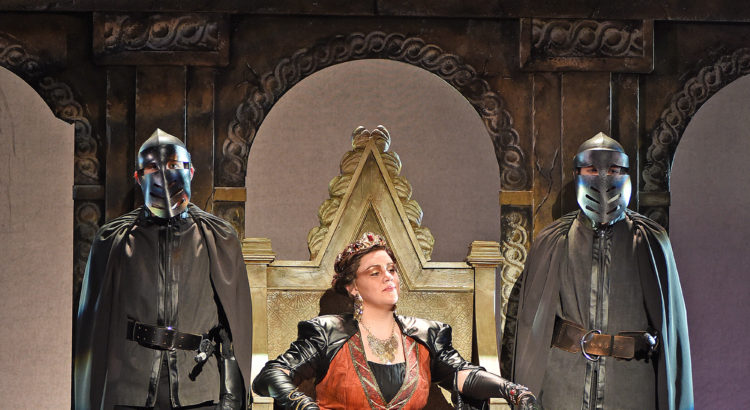This was my first time seeing a full opera performance, and unlike the guy next to me who kept dozing on and off, I loved it. I was captivated from the very beginning which had a very eerie feel, flashing lights, people still like statues, and the orchestra playing fervent music.
The scenery and outfits were awesome. I got the impression that the island was beautiful, but with an artificial non-natural sense of beauty. The colors felt fluorescent, rocks and landscapes were too symmetrical, and animals had a ghostly-dead look to their face. This was fitting, because the island is supposed to have a false sense of beauty cast by Alcina. The costumes of the characters were very bold. When they first meet Alcina, her court is filled with interesting costumes; people in masquerade masks, Trojan knights, and what looked like a holy Legolas dressed in all white. My favorite scenery design was the purple flowers that would overhang from above because of the different uses they created with these flowers. Depending on the lighting, it would be a beautiful array of purple flowers above, or simply tree overhangs representing the forest, and if the lighting was very dark it would represent a spikey cave or rock formation above.
My favorite character was Ruggerio because of how amazingly feminine his voice sounded, and how well he acted the part of a naive but entitled and faux-macho character. The whole time Ruggerio had this smug sly face that had an air of cockiness to it. In reality, he was kind of a fool, who was so easily tricked by Oronte, and after breaking out of Alcina’s spell still couldn’t recognize Bradamante. It was fitting he always looked foolish with long blond hair and pure white or gold clothes. When he would beat his chest or put his hand on Bradamante’s shoulder, I would laugh from how ridiculous the actor acted. I am curious about the exact meaning of Ruggerio having such a high pitched voice.
Oronte had a classically beautiful voice. It was soothing and clear, which was interesting because Oronte is a bad character for most of the play. Immediately I could tell Oronte was a bad character, he had a scar above his eye and was dressed in all black, so it felt unfitting that his voice sounded heroic and good-natured. In the end, Oronte goes against Alcina and becomes good, so in this way, his voice was foreshadowing. He is also a true lover, he always deeply loves Morgana no matter how she hurts him, and Oronte’s voice sounded like a true lovers voice. Every actor had an amazing operatic voice, but what also stood out to me was how gracefully Morgana was able to waver her voice and how great Melisso’s bass/baritone voice was.
Thankfully we had English subtitles case above the stage. For a three hour opera, there is actually very little dialogue, because the same word or sentence will be repeated continuously for three minutes. I was confused because it didn’t sound like the exact same sentence was being sung over and over again. Also, when words are being sung in operatic fashion, it takes a lot longer than it would to speak the same words.
I am not an expert on Handel, but I know that his music is known for sounding royal and regal. In this opera, the wavering voice was the main vocal instrument. Especially when a character was in love, every word they sang would have a vibrato, which often gave a richer tone. Again Morgana did a phenomenal job with this. The main instrument was the harpsichord, which is like an organy sounding piano. The harpsichord would play the whole time, often being the lone instrument while actors sang. The orchestra would support the harpsichord or play when there wasn’t any singing going on.




